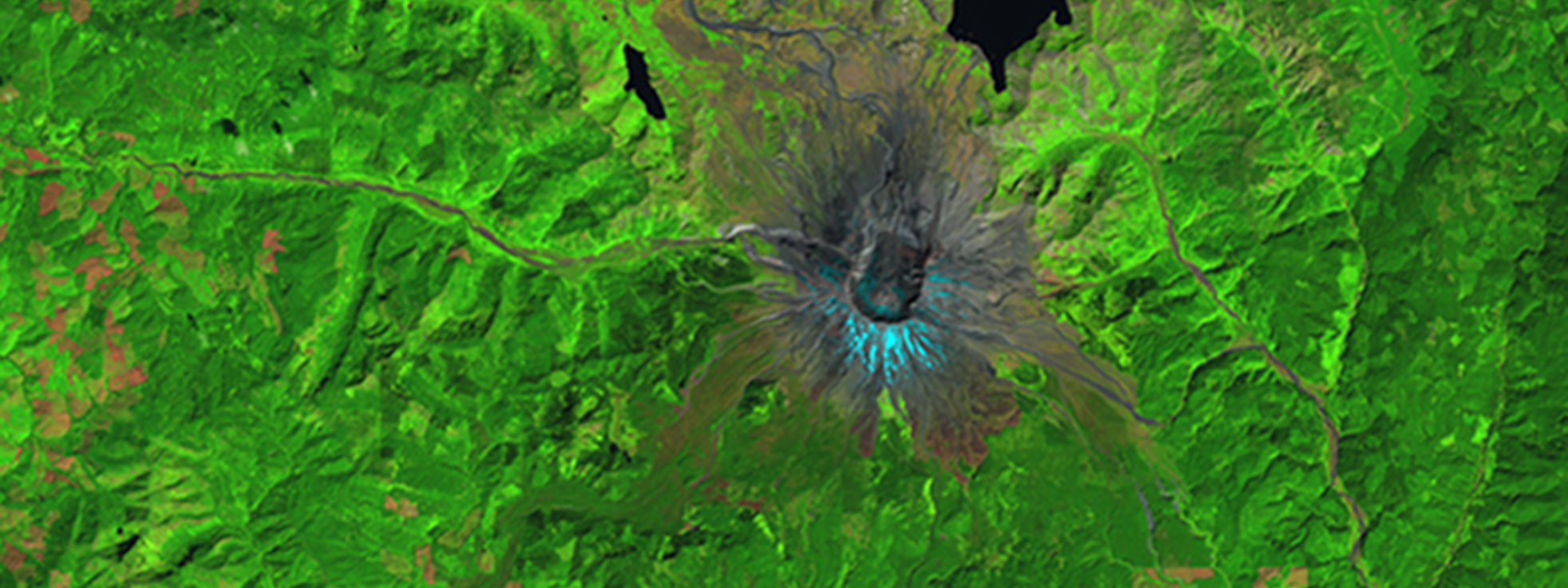
Shaping Environmental Policy from Tacoma to Washington D.C.
2014 Distinguished Alumni Award winner Sarah Ryker, ’94, took her UW Tacoma degree all the way to the White House.
This Section's arrow_downward Theme Info Is:
- Background Image: ""
- Theme: "light-theme"
- Header Style: "purple_dominant"
- Card Height Setting: "consistent_row_height"
- Section Parallax: "0"
- Section Parallax Height: ""
Above: An image of regrowth around Mt. St. Helens, taken by the Landsat technology that alumna Sarah Ryker helps manage.

Sarah Ryker, ’94, has dealt with everything from the Deepwater Horizon oil spill to winemaking.
In her work in ecology and public policy, Ryker has gone from testing regional water quality to advising the White House and working for the U.S. Geological Survey (USGS).
Ryker brings an interdisciplinary approach, begun at UW Tacoma, to questions of environmental policy. UW Tacoma celebrated this work in 2014 with the Distinguished Alumni Award (an honor she shared with Jessica Gavre).
Ryker grew up in Hong Kong, the child of university professors, but came to Tacoma as a teenager and attended Foss High School. Shortly after high school, Ryker was recruited by the USGS in Tacoma, where she began researching and publishing studies on regional water quality.
“I was at a stage where I didn’t want to walk away from that,” she says. So Ryker began classes at UW Tacoma, where she could study while continuing her budding scientific career.
Ryker initially chose UW Tacoma for its proximity to her work, but, she says, “After one quarter there, I fell in love with the intimate learning environment … (and) the really top-notch faculty.”
She especially enjoyed classes with Michael Kalton, a founding faculty member, professor of religion in the Interdisciplinary Arts and Sciences (IAS) program and former IAS director. “Mike was a great mentor and advisor and a great teacher,” says Ryker. “Since then, he’s become a friend and continues to be an important mentor in my life.”

Attending UW Tacoma also allowed Ryker to explore her varied interests. “It gave me the flexibility to combine my science career with my interest in liberal studies,” she says. Ryker graduated in 1994 with a degree in liberal studies.
In graduate school, Ryker continued in that interdisciplinary ethos, combining science with public policy. She received her Ph.D. from the department of engineering and Public Policy at Carnegie Mellon University, where her dissertation looked at different methods to analyze chemical mixtures in drinking water.
Doctorate in hand, Ryker began working at the Science and Technology Policy Institute, which advised the White Houses of both Presidents Bush and Obama. While there, she led a team of researchers in energy and environmental policy analysis. Her team advised the presidents on energy efficiency policies and satellite data and was called in to help respond to the Deepwater Horizon oil spill in 2010.
Then, three years ago, Ryker returned to the USGS, where she now provides science and policy leadership. As the deputy associate director for climate and land use change, Ryker oversees the USGS Climate Research and Development Program, Land Change Science Program, Land Remote Sensing Program and National Climate Change and Wildlife Science Center.
In this role, Ryker supervises the Department of the Interior Landsat program, the longest-running civilian satellite program, generating critical data for both the economy and management of natural resources.
It was Landsat data that first quantified the extent of deforestation in the Amazon rainforest. This data helped prompt global treaties and Brazilian efforts to preserve the rainforest. Landsat data also helped California winemaker Gallo deal with the state’s drought, reducing its water usage by 30% while improving grape quality.

As climate change effects are becoming more pronounced, the satellites are helping areas like the U.S. Southwest adapt to drought and adjudicate water rights. The satellites have also informed responses to wildfires and tracked regrowth in burned regions.
Ryker’s interdisciplinary education informs her work. “I get to keep my hand in the science and also get to work in these big policy areas,” she says.
When she’s not working, Ryker plays the violin and enjoys the cultural offerings of Washington D.C. She is also studying Italian with her mother and sister in preparation for a family trip.
Ryker recently visited the UW Tacoma campus and was “completely taken by surprise” at its growth; the university had been housed entirely within the Perkins Building on South A Street when she attended. Ryker says she would have loved to have had the resources of UW Tacoma’s current environmental science program as an undergrad.
“UW Tacoma was a great experience that changed my life, and I’m thrilled to see it growing up in downtown Tacoma and serving more of the region,” she says. “(It’s a) very good thing for Tacoma and the South Sound.”
Recent news
Main Content
Gathering Strength
News Tags on this arrow_upward Story:
- None
Main Content
UW Tacoma Enrollment up 4% for Autumn 2024
News Tags on this arrow_upward Story:
- None
Main Content
Celebrating First Gen
News Tags on this arrow_upward Story:
- None



